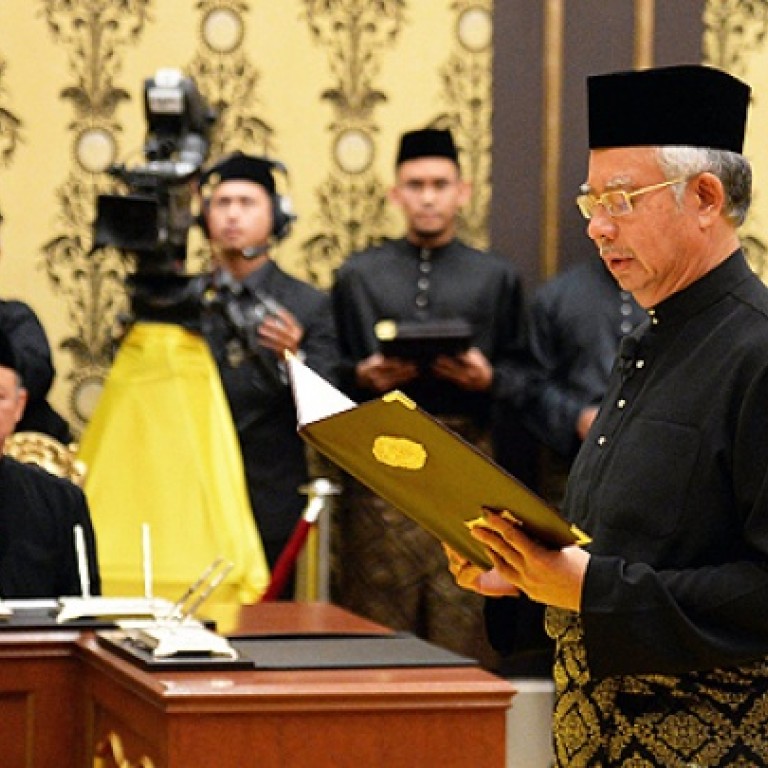
Najib Razak sworn in as opposition protests Malaysia poll
Malaysian Prime Minister Najib Razak began a second term on Monday after the coalition which has ruled for 56 years held on to power in elections branded as fraudulent by a bitter opposition.
Opposition leader Anwar Ibrahim called for a rally in two days’ time to protest at a victory he said was achieved via the “worst electoral fraud in our history” and which saw the ruling camp win with a minority of the vote.
Najib’s Barisan Nasional (National Front) coalition that has ruled since independence in 1957 held off a spirited opposition challenge to retain a firm parliamentary majority.
But the opposition called a rally for Wednesday in a stadium on the outskirts of Kuala Lumpur to denounce what it called foul play.
I call upon as many Malaysians to join hands and express our rejection and disgust at the unprecedented electoral fraud committed by Najib Razak and the EC
“I call upon as many Malaysians to join hands and express our rejection and disgust at the unprecedented electoral fraud committed by Najib Razak and the EC (Election Commission),” Anwar said in a statement.
The conduct of the polls was a “crime” against Malaysians, the 65-year-old said earlier in an interview. “The government has lost its legitimacy.”
Supporters of the three-party Pakatan Rakyat (People’s Pact) opposition alliance were left bitter and despondent after an election which they hoped would bring a historic change of government.
Barisan won 133 seats in the 222-member parliament, two fewer than in the last parliament. The opposition alliance won 89 seats, an increase of 14, largely at the expense of non-aligned candidates.
But the ruling bloc won just 48 per cent of the popular vote compared to nearly 52 per cent for the opposition.
This makes Najib the first leader in four decades to win with a minority of the ballots according to Malaysian media. Critics said the figure proved the electoral system was skewed in the government’s favour.
Najib, 59, who had promised free and fair polls and has since brushed off numerous allegations of irregularities, was sworn in by the king at the ornate national palace in Kuala Lumpur.
Shortly after his victory, he acknowledged that the election – which indicated that ethnic Chinese had continued a trend of deserting Barisan – had laid bare deep racial divisions in the majority Malay nation.
“Overall, the results show a trend of polarisation which worries the government. If it is not addressed it can create tension or division in the country,” he said, promising to pursue reconciliation.
Anwar said the opposition would look into fraud allegations in dozens of constituencies and decide “whether (to file) election petitions or to go to the courts”.
Azizuddin Sani, a politics expert at Universiti Utara Malaysia, said it would be “very difficult” to challenge the result. “Anwar can complain, but I don’t think it will change the results,” he said.
Pakatan has made major inroads in recent years under Anwar – a former Barisan star who was ousted and jailed by the regime in a 1998 power struggle – by capitalising on public fatigue with corruption and authoritarianism.
Outraged voters took to the internet in droves to complain that indelible ink which Najib touted as a guarantee against multiple voting was found to easily wash off.
Videos, pictures and first-hand accounts of angry citizens confronting purportedly foreign “voters” at polling centres also went viral online.
Anwar has alleged there was a scheme to fly tens of thousands of “dubious” and possibly foreign voters to sway the outcome in key constituencies.
Analysts had said Najib could have faced an internal party challenge in his United Malays National Organisation (UMNO), the ultimate power in the ruling coalition, had he lost significant ground but that risk may have receded.
“He has been able to fend off the strongest opposition in living memory and has survived. That counts for something in UMNO,” said leading pollster Ibrahim Suffian.
Najib, who took office in 2009, has faced rising public calls for reform.
He has responded with limited liberalisation moves dismissed by critics as cosmetic steps that dodge deep change to avoid upsetting a ruling Malay elite.
Sunday’s outcome raised the spectre of an end to the remarkable career of the charismatic Anwar. He has vowed to step aside as opposition leader if Pakatan fails to unseat the government.
